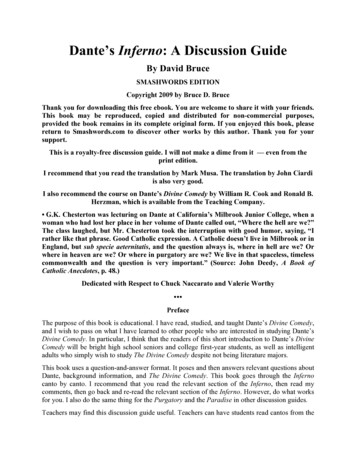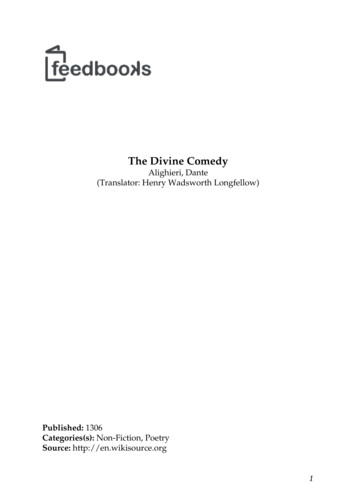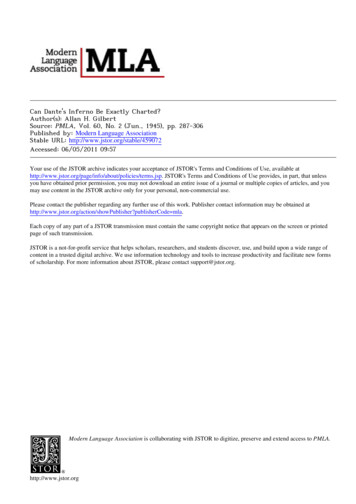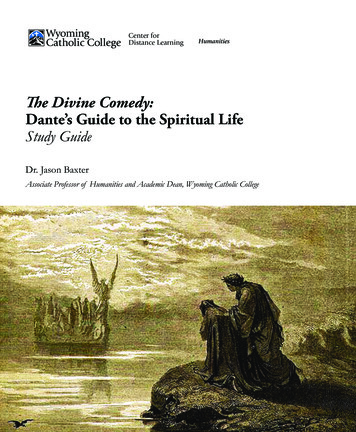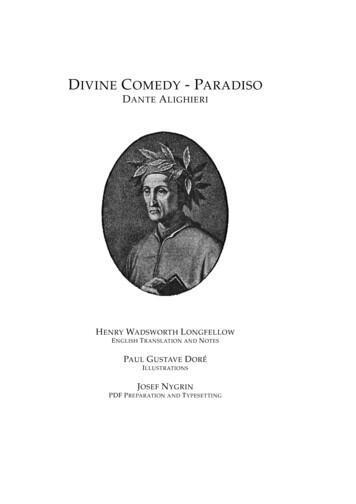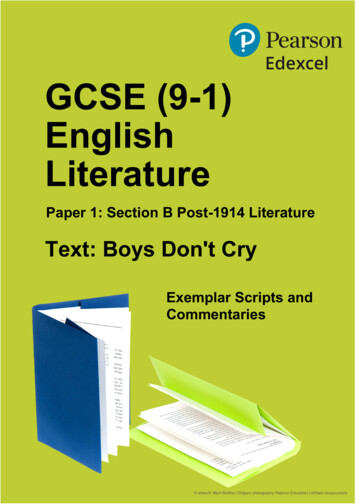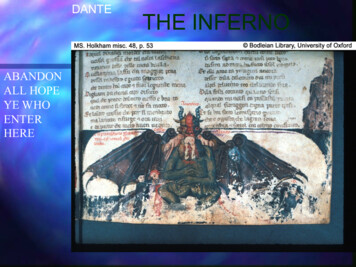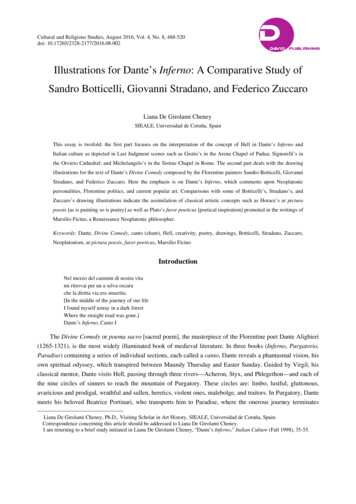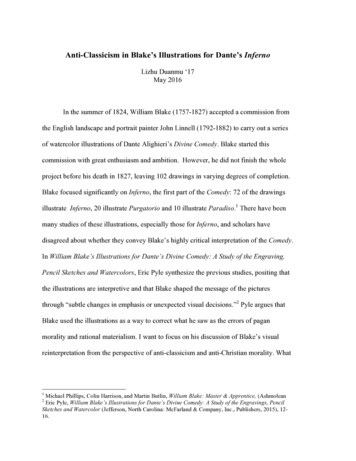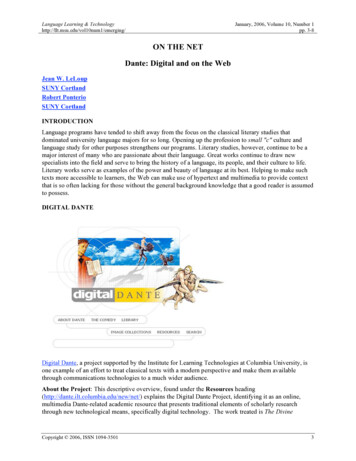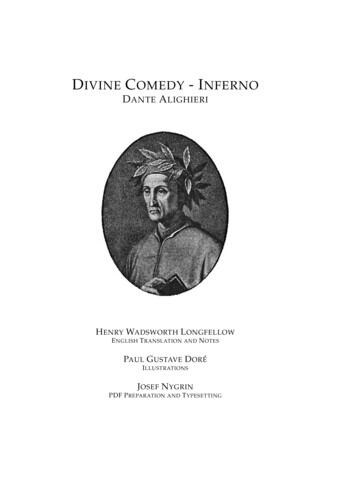
Transcription
D IVINE C OMEDY - I NFERNOD ANTE A LIGHIERIH ENRY WADSWORTH L ONGFELLOWE NGLISH T RANSLATION AND N OTESPAUL G USTAVE D OR ÉI LLUSTRATIONSJ OSEF N YGRINPDF P REPARATION AND T YPESETTING
E NGLISH T RANSLATION AND N OTESHenry Wadsworth Longfellow
I LLUSTRATIONSPaul Gustave Doré
Released under Creative Commons Attribution-Noncommercial 3.0/us/You are free:to share – to copy, distribute, display, and perform the work;to remix – to make derivative works.Under the following conditions:attribution – you must attribute the work in the manner specified by the authoror licensor (but not in any way that suggests that they endorse you or your useof the work);noncommercial – you may not use this work for commercial purposes.Any of the above conditions can be waived if you get permission fromthe copyright holder.English translation and notes by H. W. Longfellow obtained s of illustrations by P. G. Doré obtained fromhttp://www.danshort.com/dc/, scanned by Dan Short, used withpermission.M I KT E X LATEX typesetting by Josef Nygrin, in Jan & Feb 2008.http://www.paskvil.com/Some rights reserved c 2008 Josef Nygrin
ContentsCanto 11Canto 29Canto 316Canto 423Canto 530Canto 638Canto 744Canto 851Canto 958Canto 1065Canto 1171Canto 1277Canto 1385Canto 1493Canto 1599Canto 16104Canto 17110
Canto 18116Canto 19124Canto 20131Canto 21136Canto 22143Canto 23150Canto 24158Canto 25164Canto 26171Canto 27177Canto 28183Canto 29192Canto 30200Canto 31207Canto 32215Canto 33222Canto 34231Dante Alighieri239Henry Wadsworth Longfellow245Paul Gustave Doré251Some rights reserved c 2008 Josef Nygrinhttp://www.paskvil.com/
Inferno
Figure 1: Midway upon the journey of our life I found myself within aforest dark.
InfernoCanto 1Mupon the journey of our life 1I found myself within a forest dark, 2For the straightforward pathway had been lost.IDWAYAh me! how hard a thing it is to sayWhat was this forest savage, rough, and stern,Which in the very thought renews the fear.So bitter is it, death is little more;But of the good to treat, which there I found,Speak will I of the other things I saw there.I cannot well repeat how there I entered,So full was I of slumber at the momentIn which I had abandoned the true way.But after I had reached a mountain’s foot, 3At that point where the valley terminated, 4Which had with consternation pierced my heart,Upward I looked, and I beheld its shoulders1The action of the poem begins on Good Friday of the year 1300, at which time Dante,who was born in 1265, had reached the middle of the Scriptual threescore years and ten.It ends on the first Sunday after Easter, making in all ten days.2The dark forest of human life, with its passions, vices, and perplexities of all kinds;politically the state of Florence with its fractions Guelf and Ghibelline.3Bunyan, in his Pilgrim’s Progress, which is a kind of Divine Comedy in prose, says: “Ibeheld then that they all went on till they came to the foot of the hill Difficulty. But thenarrow way lay right up the hill, and the name of the going up the side of the hill is calledDifficulty. They went then till they came to the Delectable Mountains, which mountainsbelong to the Lord of that hill of which we have spoken before.”4Bunyan, Pilgrim’s Progress – “But now in this valley of Humiliation poor Christianwas hard put to it; for he had gone but a little way before he spied a foul fiend comingover the field to meet him; his name is Apollyon. Then did Christian begin to be afraid,and to cast in his mind whether to go back or stand his ground. .Now at the end of thisvalley was another, called the valley of the Shadow of Death; and Christian must needsgo through it, because the way to the Celestial City lay through the midst of it.”1
2http://www.paskvil.com/Vested already with that planet’s rays 5Which leadeth others right by every road.Then was the fear a little quietedThat in my heart’s lake had endured throughout 6The night, which I had passed so piteouslyAnd even as he, who, with distressful breath,Forth issued from the sea upon the shore,Turns to the water perilous and gazes;So did my soul, that still was fleeing onward,Turn itself back to re-behold the passWhich never yet a living person left. 7After my weary body I had rested,The way resumed I on the desert slope,So that the firm foot ever was the lower.8And lo! almost where the ascent began, 9A panther light and swift exceedingly, 10Which with a spotted skin was covered o’er!And never moved she from before my face,Nay, rather did impede so much my way,That many times I to return had turned. 11The time was the beginning of the morning,And up the sun was mounting with those stars 12That with him were, what time the Love Divine5The sun, with all its symbolical meanings. This is the morning of Good Friday. In thePtolemaic system the sun was one of the planets.6The deep mountain tarn of his heart, dark with its own depth, and the shadowshanging over it.7Jeremiah ii. 6: “That led us through the wilderness, through a land of deserts and ofpits, through a land of drought, and of the shadow of death, through a land that no manpassed through, and where no man dwelt.” In his note upon this passage Mr. Wrightquotes Spenser’s lines, Faerie Queene, I. v. 31, – “there creature never passed That backreturned without heavenly grace.”8Climbing the hillside slowly, so that he rests longest on the foot that is lowest.9Jeremiah v. 6: “Wherefore a lion out of the forest shall slay them, a wolf of the eveningshall spoil them, a leopard shall watch over their cities: every one that goeth out thenceshall be torn in pieces.”10Wordly Pleasure; and politically Florence, with its factions of Bianchi and Neri.11Più volte volto. Dante delights in a play upon words as much as Shakespeare.12The stars of Aries. Some philosophers and fathers think the world was created inSpring.
Dante Alighieri - Divine Comedy, Inferno3Figure 2: And lo! almost where the ascent began, a panther light and swiftexceedingly.At first in motion set those beauteous things;So were to me occasion of good hope,The variegated skin of that wild beast,The hour of time, and the delicious season;But not so much, that did not give me fearA lion’s aspect which appeared to me. 13He seemed as if against me he were comingWith head uplifted, and with ravenous hunger,So that it seemed the air was afraid of him; 14And a she-wolf, that with all hungerings 15Seemed to be laden in her meagreness,And many folk has caused to live forlorn!13Ambition; and politically the royal house of France.Some editions read temesse, others tremesse.15Avarice; and politically the Court of Rome, or temporal power of the Popes.14
4http://www.paskvil.com/She brought upon me so much heaviness,With the affright that from her aspect came,That I the hope relinquished of the height.And as he is who willingly acquires,And the time comes that causes him to lose,Who weeps in all his thoughts and is despondent,E’en such made me that beast withouten peace,Which, coming on against me by degreesThrust me back thither where the sun is silent 16While I was rushing downward to the lowland,Before mine eyes did one present himself,Who seemed from long-continued silence hoarse.17When I beheld him in the desert vast,“Have pity on me,” unto him I cried,“Whiche’er thou art, or shade or real man!”He answered me: “Not man; man once I was,And both my parents were of Lombardy,And Mantuans by country both of them.Sub Julio was I born, though it was late, 18And lived at Rome under the good Augustus,During the time of false and lying gods.A poet was I, and I sang that justSon of Anchises, who came forth from Troy,After that Ilion the superb was burnedBut thou, why goest thou back to such annoyance?Why climb’st thou not the Mount DelectableWhich is the source and cause of every joy?”Now, art thou that Virgilius and that fountain 1916Dante as a Ghibelline and Imperialist is in opposition to the Guelfs, Pope BonifaceVIII., and the King of France, Philip the Fair, and is banished from Florence, out of thesunshine, and into “the dry wind that blows from dolorous poverty.” Cato speaks of the“silent moon” in De Re Rustica, XXIV., Evehito luna silenti; and XL., Vites inseri luna silenti.Also Pliny, XVI. 39, has Silens luna; and Milton, in Samson Agonistes, “Silent as the moon.”17The long neglect of classic studies in Italy before Dante’s time.18Born under Julius Caesar, but too late to grow up to manhood during his Imperialreign. He florished later under Augustus.19In this passage Dante but expresses the universal veneration felt for Virgil during theMiddle Ages, and especially in Italy. Petrarch’s copy of Virgil is still preserved in theAmbrosian Library at Milan; and at the beginning of it he has recorded in a Latin note
5Dante Alighieri - Divine Comedy, InfernoWhich spreads abroad so wide a river of speech?”I made response to him with bashful forehead.“O, of the other poets honour and light,Avail me the long study and great loveThat have impelled me to explore thy volume!Thou art my master, and my author thou,Thou art alone the one from whom I tookThe beautiful style that has done honour to me.20Behold the beast, for which I have turned back;Do thou protect me from her, famous Sage,For she doth make my veins and pulses tremble.”Thee it behoves to take another road,”Responded he, when he beheld me weeping,”If from this savage place thou wouldst escape;Because this beast, at which thou criest out,Suffers not any one to pass her way,But so doth harass him, that she destroys him;And has a nature so malign and ruthless,That never doth she glut her greedy will,And after food is hungrier than before.Many the animals with whom she weds,And more they shall be still, until the Greyhound 21Comes, who shall make her perish in her pain.He shall not feed on either earth or pelf,the time of his first meeting with Laura, and the date of her death, which, he says, “Iwrite in this book, rather than elsewhere, because it comes often under my eye.” In thepopular imagination Virgil became a mythical personage and a mighty magician. See thestory of Virgilius in Thom’s Early Prose Romances, II. Dante selects him for his guide, assymbolizing human science or Philosophy. “I say and affirm,” he remarks, Convito, V. 16,“that the lady with whom I became enamored after my first love was the most beautifuland modest daughter of the Emperor of the Universe, to whom Pythagoras gave thename of Philosophy.”20Dante seems to have been already conscious of the fame which his Vita Nuova andCanzoni had given him.21The greyhound is Can Grande della Scala, Lord of Verona, Imperial Vicar, Ghibelline,and friend of Dante. Verona is between Feltro in the Marca Trivigiana, and Montefeltroin Romagna. Boccaccio, Decameron, I. 7, peaks of him as “one of the most notable andmagnificant lords that had been known in Italy, since the Emperor Frederick the Second.”To him Dante dedicated the Paradiso. Some commentators think the Veltro is not CanGrande, but Ugguccione della Faggiola. See Troya, Del Veltro Allegorico di Dante.
6http://www.paskvil.com/But upon wisdom, and on love and virtue;‘Twixt Feltro and Feltro shall his nation be;Of that low Italy shall he be the saviour, 22On whose account the maid Camilla died,Euryalus, Turnus, Nisus, of their wounds;Through every city shall he hunt her down,Until he shall have driven her back to Hell,There from whence envy first did let her loose.Therefore I think and judge it for thy bestThou follow me, and I will be thy guide,And lead thee hence through the eternal place,Where thou shalt hear the desperate lamentations, 23Shalt see the ancient spirits disconsolate,Who cry out each one for the second death;And thou shalt see those who contented areWithin the fire, because they hope to come,Whene’er it may be, to the blessed people;To whom, then, if thou wishest to ascend,A soul shall be for that than I more worthy; 24With her at my departure I will leave thee;Because that Emperor, who reigns above,In that I was rebellious to his law,Wills that through me none come into his city.He governs everywhere and there he reigns;There is his city and his lofty throne;O happy he whom thereto he elects!”And I to him: “Poet, I thee entreat,By that same God whom thou didst never know,So that I may escape this woe and worse,Thou wouldst conduct me there where thou hast said,That I may see the portal of Saint Peter,And those thou makest so disconsolate.”Then he moved on, and I behind him followed.22The plains of Italy, in contradistinction to the mountains; the Humilemque Italiam ofVirgil, Æneid, III. 522: “And now the stars being chased away, blushing Aurora appeared,when far off we espy the hills obscure, and lowly Italy.”23I give preference to the reading, Di quegli antichi spiriti dolenti.24Beatrice.
Dante Alighieri - Divine Comedy, InfernoFigure 3: A lion’s aspect which appeared to me.7
8http://www.paskvil.com/Figure 4: Then he moved on, and I behind him followed.
InfernoCanto 2Dwas departing, and the embrowned airReleased the animals that are on earth 25From their fatigues; and I the only oneAYMade myself ready to sustain the war,Both of the way and likewise of the woe,Which memory that errs not shall retrace.O Muses, O high genius, now assist me!O memory, that didst write down what I saw,Here thy nobility shall be manifest!And I began: “Poet, who guidest me,Regard my manhood, if it be sufficient.Ere to the arduous pass thou dost confide me.Thou sayest, that of Silvius the parent, 26While yet corruptible, unto the worldImmortal went, and was there bodily.But if the adversary of all evilWas courteous, thinking of the high effectThat issue would from him, and who, and what,To men of intellect unmeet it seems not;For he was of great Rome, and of her empireIn the empyreal heaven as father chosen;The which and what, wishing to speak the truth,Were stablished as the ho]y place, whereinSits the successor of the greatest Peter. 2725Dante, Convito III. 2, says: “Man is called by philosophers the divine animal.”Æneas, founder of the Roman Empire. Virgil, Æneid, B. VI.27“That is,” says Boccaccio, Comento, “St. Peter the Apostle, called the greater on account of his papal dignity, and to distinguish him from many other holy men of the samename.”269
10http://www.paskvil.com/Upon this journey, whence thou givest him vaunt,Things did he hear, which the occasion wereBoth of his victory and the papal mantle.Thither went afterwards the Chosen Vessel,To bring back comfort thence unto that Faith,Which of salvation’s way is the beginning.But I, why thither come, or who concedes it?I not Aenas am, I am not Paul,Nor I, nor others, think me worthy of it.Therefore, if I resign myself to come,I fear the coming may be ill-advised;Thou’rt wise, and knowest better than I speak.”And as he is, who unwills what he willed,And by new thoughts doth his intention change,So that from his design he quite withdraws,Such I became, upon that dark hillside,Because, in thinking, I consumed the emprise,Which was so very prompt in the beginning. 28“If I have well thy language understood,”Replied that shade of the Magnanimous,“Thy soul attainted is with cowardice,Which many times a man encumbers so,It turns him back from honoured enterprise,As false sight doth a beast, when he is shy.That thou mayst free thee from this apprehension,I’ll tell thee why I came, and what I heardAt the first moment when I grieved for thee.Among those was I who are in suspense, 29And a fair, saintly Lady called to meIn such wise, I besought her to command me.Her eyes where shining brighter than the Star; 3028Shakespear, Macbeth, IV. i: “The flighty purpose never is o’ertook, Unless the deed gowith it.”29Suspended in Limbo; neither in pain nor in glory.30Brighter than the star; than “that star which is brightest,” comments Boccaccio. Others say the Sun, and refer to Dante’s Canzone, beginning: “The star of beauty which dothmeasure time, The lady seems, who has enamored me, Placed in the heaven of Love.”
Dante Alighieri - Divine Comedy, Inferno11And she began to say, gentle and low, 31With voice angelical, in her own language“O spirit courteous of Mantua,Of whom the fame still in the world endures,And shall endure, long-lasting as the world;A friend of mine, and not the friend of fortune,Upon the desert slope is so impededUpon his way, that he has turned through terror,And may, I fear, already be so lost,That I too late have risen to his succour,From that which I have heard of him in Heaven.Bestir thee now, and with thy speech ornate, 32And with what needful is for his release,Assist him so, that I may be consoled.Beatrice am I, who do bid thee go; 33I come from there, where I would fain return;Love moved me, which compelleth me to speak.When I shall be in presence of my Lord,Full often will I praise thee unto him.”Then paused she, and thereafter I began:“O Lady of virtue, thou alone through whomThe human race exceedeth all contained31Shakespeare, King Lear, V. 3: – “Her voice was ever soft, Gentle, and low; an excellentthing in woman.”32This passage will recall Minerva transmitting the message of Juno to Achilles, Iliad,II.: “Go thou forthwith to the army of the Achæans, and hesitate not, but restrain eachman with thy persuasive words, nor suffer them to drag to the sea their double-oaredships.”33Beatrice Portinari, Dante’s first love, the inspiration of his song and in his mind thesymbol of the Divine. He says of her in the Vita Nuova: – “This most gentle lady, of whomthere has been discourse in what precedes, reached such favour among the people, thatwhen she passed along the way persons ran to see her, which gave me wonderful delight.And when she was near any one, such modesty took possession of his heart, that he didnot dare to raise his eyes or to return her salutation; and to this, should any one doubtit, many, as having experienced it, could bear witness for me. She, crowned and clothedwith humility, took her way, displaying no pride in that which she saw and heard. Many,when she had passed said, ‘This is not a woman, rather is she one of the most beautifulangels of heaven.’ Others said, ‘She is a miracle. Blessed be the Lord who can performsuch a marvel.’ I say, that she showed herself so gentle and so full of all beauties, thatthose who looked on her felt within themselves a pure and sweet delight, such as theycould not tell in words.” – C.E. Norton, The New Life, 51, 52.
12http://www.paskvil.com/Within the heaven that has the lesser circles, 34So grateful unto me is thy commandment,To obey, if ’twere already done, were late;No farther need’st thou ope to me thy wish.But the cause tell me why thou dost not shunThe here descending down into this centre,From the vast place thou burnest to return to.” 35“Since thou wouldst fain so inwardly discern,Briefly will I relate,” she answered me,“Why I am not afraid to enter here.Of those things only should one be afraidWhich have the power of doing others harm;Of the rest, no; because they are not fearful.God in his mercy such created meThat misery of yours attains me not,Nor any flame assails me of this burningA gentle Lady is in Heaven, who grieves 36At this impediment, to which I send thee,So that stern judgment there above is broken.In her entreaty she besought Lucia, 37And said, “Thy faithful one now stands in needOf thee, and unto thee I recommend him.”Lucia, foe of all that cruel is,Hastened away, and came unto the placeWhere I was sitting with the ancient Rachel.38“Beatrice” said she, “the true praise of God,Why succourest thou not him, who loved thee so,For thee he issued from the vulgar herd?Dost thou not hear the pity of his plaint?Dost thou not see the death that combats himBeside that flood, where ocean has no vaunt?” 3934The heaven of the moon, which contains or encircles the earth.The ampler circles of Paradise.36Divine Mercy.37St Lucia, emblem of enlightening Grace.38Rachel, emblem of Divine Contemplation. See Par. XXXII. 9.39Beside that flood, where ocean has no vaunt; “That is,” says Boccacio, Comento, “the seacannot boast of being more impetuous or more dangerous than that.”35
Dante Alighieri - Divine Comedy, InfernoNever were persons in the world so swiftTo work their weal and to escape their woe,As I, after such words as these were uttered,Came hither downward from my blessed seat,Confiding in thy dignified discourse,Which honours thee, and those who’ve listened to it.”After she thus had spoken unto me,Weeping, her shining eyes she turned away;Whereby she made me swifter in my coming;And unto thee I came, as she desired;I have delivered thee from that wild beast,Which barred the beautiful mountain’s short ascent.What is it, then? Why, why dost thou delay?Why is such baseness bedded in thy heart?Daring and hardihood why hast thou not,Seeing that three such Ladies benedightAre caring for thee in the court of Heaven,And so much good my speech doth promise thee?”Even as the flowerets, by nocturnal chill,Bowed down and closed, when the sun whitens them,Uplift themselves all open on their stems;Such I became with my exhausted strength,And such good courage to my heart there coursed,That I began, like an intrepid person:“O she compassionate, who succoured me,And courteous thou, who hast obeyed so soonThe words of truth which she addressed to thee!Thou hast my heart so with desire disposedTo the adventure, with these words of thine,That to my first intent I have returned.Now go, for one sole will is in us both,Thou Leader, and thou Lord, and Master thou.”Thus said I to him; and when he had moved,I entered on the deep and savage way.13
14http://www.paskvil.com/Figure 5: Day was departing.
Dante Alighieri - Divine Comedy, InfernoFigure 6: “Beatrice am I, who do bid thee go; .”15
InfernoCanto 3Tme the way is to the city dolent; 40Through me the way is to eternal dole;Through me the way among the people lost.HROUGHJustice incited my sublime Creator;Created me divine Omnipotence,The highest Wisdom and the primal Love.Before me there were no created things,Only eterne, and I eternal last.“All hope abandon, ye who enter in!”These words in sombre colour I beheldWritten upon the summit of a gate;Whence I: “Their sense is, Master, hard to me!”And he to me, as one experienced:“Here all suspicion needs must be abandoned,All cowardice must needs be here extinct.We to the place have come, where I have told theeThou shalt behold the people dolorousWho have foregone the good of intellect.” 41And after he had laid his hand on mineWith joyful mien, whence I was comforted,He led me in among the secret things.40This canto begins with a repetition of sounds like the tolling of a funeral bell: dolente.dolore!41Aristotle says: “The good of the intellect is the highest beatitude”; and Dante in theConvito: “The True is the good of the intellect.” In other words, the knowledge of God isintellectual good. “It is a most just punishment,” says St. Augustine, “that man shouldlose that freedom which man could not use, yet had power to keep, if he would, and thathe who had knowledge to do what was right, and did not do it, should be deprived ofthe knowledge of what was right; and that he who would not do righteously, when hehad the power, should lose the power to do it when he had the will.”16
Dante Alighieri - Divine Comedy, InfernoFigure 7: “All hope abandon, ye who enter in!”There sighs, complaints, and ululations loudResounded through the air without a star,Whence I, at the beginning, wept thereat.Languages diverse, horrible dialects,Accents of anger, words of agony,And voices high and hoarse, with sound of hands,Made up a tumult that goes whirling onFor ever in that air for ever black,Even as the sand doth, when the whirlwind breathes.And I, who had my head with horror bound,Said: “Master, what is this which now I hear?What folk is this, which seems by pain so vanquished?”And he to me: “This miserable modeMaintain the melancholy souls of thoseWho lived withouten infamy or praise.Commingled are they with that caitiff choir17
18http://www.paskvil.com/Of Angels, who have not rebellious been,Nor faithful were to God, but were for self.The heavens expelled them, not to be less fair;Nor them the nethermore abyss receives,For glory none the damned would have from them.”And I: “O Master, what so grievous isTo these, that maketh them lament so sore?”He answered: “I will tell thee very briefly.These have no longer any hope of death;And this blind life of theirs is so debased,They envious are of every other fate.No fame of them the world permits to be;Misericord and Justice both disdain them.Let us not speak of them, but look, and pass.”And I, who looked again, beheld a banner, 42Which, whirling round, ran on so rapidly,That of all pause it seemed to me indignant;And after it there came so long a trainOf people, that I ne’er would have believedThat ever Death so many had undone.When some among them I had recognised.I looked, and I beheld the shade of himWho made through cowardice the great refusal.43Forthwith I comprehended, and was certain,That this the sect was of the caitiff wretchesHateful to God and to his enemies.These miscreants, who never were alive,Were naked, and were stung exceedinglyBy gadflies and by hornets that were there.These did their faces irrigate with blood,Which, with their tears commingled, at their feetBy the disgusting worms was gathered up.And when to gazing farther I betook me.People I saw on a great river’s bank;Whence said I: “Master, now vouchsafe to me,4243This restless flag is an emblem of the shifting and unstable minds of its followers.Generally supposed to be Pope Celestine V.
19Dante Alighieri - Divine Comedy, InfernoThat I may know who these are, and what lawMakes them appear so ready to pass over,As I discern athwart the dusky light.” 44And he to me: “These things shall all be knownTo thee, as soon as we our footsteps stayUpon the dismal shore of Acheron.”Then with mine eyes ashamed and downward cast,Fearing my words might irksome be to him,From speech refrained I till we reached the river.And lo! towards us coming in a boat 45An old man, hoary with the hair of eld,Crying: “Woe unto you, ye souls depravedHope nevermore to look upon the heavens;I come to lead you to the other shore,To the eternal shades in heat and frost.And thou, that yonder standest, living soul,Withdraw thee from these people, who are dead!But when he saw that I did not withdraw,46He said: “By other ways, by other portsThou to the shore shalt come, not here, for passage;44Spencer’s “misty dampe of misconceyving night.”Virgil, Æneid, VI., Davidson’s translation: – “A grim ferryman guards these floodsand rivers, Charon, of frightful slovenliness; on whose chin a load of gray hair neglectedlies; his eyes are flame: his vestments hang from his shoulders by a knot, with filth overgrown. Himself thrusts on the barge with a pole, and tends the sails, and wafts overthe bodies in his iron-colored boat, now in years: but the god is of fresh and green oldage. Hither the whole tribe in swarms come pouring to the banks, matrons and men, thesouls of magnanimous heroes who had gone through life, boys and unmarried maids,and young men who had been stretched on the funeral pile before the eyes of their parents; as numerous as withered leaves fall in the woods with the first cold of autumn, oras numerous as birds flock to the land from deep ocean, when the chilling year drivesthem beyond sea, and sends them to sunny climes. They stood praying to cross the floodthe first, and were stretching forth their hands with fond desire to gain the further bank:but the sullen boatman admits sometimes these, sometimes those; while others to a greatdistance removed, he debars from the banks.”And Shakespeare, Richard III., I. 4:“I passed, methought, the melancholy floodWith that grim ferryman which poets write of,Unto the kingdom of perpetual night.”46Virgil Æneid, VI.:“This is the region of Ghosts, of sleep and drowsyNight; to waft over the bodies of the living in my Stygian boat is not permitted.”45
20http://www.paskvil.com/A lighter vessel needs must carry thee.” 47And unto him the Guide: “Vex thee not, Charon;It is so willed there where is power to doThat which is willed; and farther question not.”Thereat were quieted the fleecy cheeksOf him the ferryman of the livid fen,Who round about his eyes had wheels of flame.But all those souls who weary were and nakedTheir colour changed and gnashed their teeth together,As soon as they had heard those cruel words.God they blasphemed and their progenitors,The human race, the place, the time, the seedOf their engendering and of their birth!Thereafter all together they drew back,Bitterly weeping, to the accursed shore,Which waiteth every man who fears not God.Charon the demon, with the eyes of glede, 48Beckoning to them, collects them all together,Beats with his oar whoever lags behind.As in the autumn-time the leaves fall off,First one and then another, till the branchUnto the earth surrenders all its spoils;In similar wise the evil seed of AdamThrow themselves from that margin one by one,At signals, as a bird unto its lure. 49So they depart across the dusky wave,And ere upon the other side they land,Again on this side a new troop assembles.“My son,” the courteous Master said to me,47The souls that were to be saved assembled at the mouth of the Tiber, where theywere received by the celestial pilot, or ferryman, who transported them to the shores ofPurgatory, as described in Purg. II.48Dryden’s Æneid, B. VI.: – “His eyes like hollow furnaces on fire.”49Mr. Ruskin, Modern Painters, III. 160, says: – “When Dante describes the spirits fallingfrom the bank of Acheron ‘as dead leaves flutter from a bough,’ he gives the most perfectimage possible of their utter lightness, feebleness, passiv
17The long neglect of classic studies in Italy before Dante's time. 18Born under Julius Caesar, but too late to grow up to manhood during his Imperial reign. He florished later under Augustus. 19In this passage Dante but expresses the universal veneration felt for Virgil during the Middle Ages, and especially in Italy.
